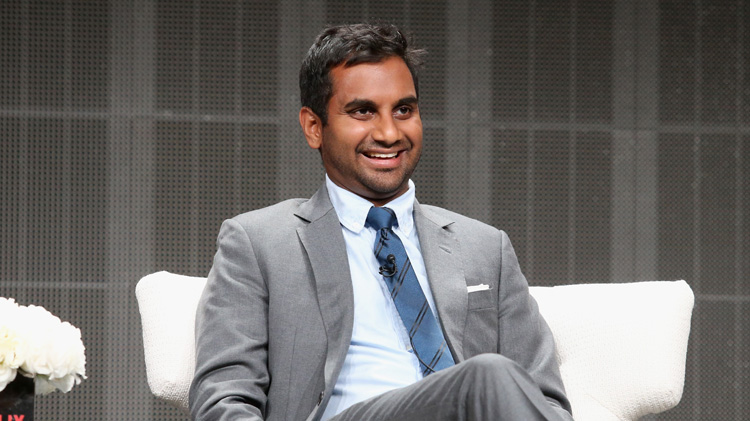
Getty Images
HLN’s Ashleigh Banfield Isn’t the Only One That Missed the Mark on Aziz Ansari
In the months since allegations against Harvey Weinstein first came out, we’ve seen — for maybe the first time maybe ever in my 26 years of life — people not only openly talking about the horrific prevalence of sexual assault and harassment with the #MeToo movement, but also mobilizing and taking action on scales both large and small with organizations such as #TimesUp. In fact, seeing my peers (male and female) literally take to the streets for countless women’s marches across the country — and to their keyboards to express their disgust with society — has been the teeny, tiny glimmer of light in the year that followed an accused sexual predator being sworn in to our highest office of power.
However, it seems like nearly every ounce of progress we made with talking about the problem women face in our society came spiraling and falling apart when a woman came forward and shared her account of a date she went on with comedian (and self-proclaimed feminist) Aziz Ansari. In a piece for babe, the woman — identified using only the pseudonym “Grace” — calls the otherwise “beautiful, warm September night” the worst evening of her life. She describes their encounter at his apartment, saying he was very aggressive and ignored her non-verbal, verbal, and physical cues that she wasn’t interested in going any further with him sexually.
Somehow — despite the fact that she literally said something to the effect of “Whoa, let’s relax for a sec, let’s chill,” when she felt their physical interaction escalating too quickly, and kept moving her hand away from his genitals (he kept putting her hand back on his crotch); she recalls, “He probably moved my hand to his dick five to seven times. He really kept doing it after I moved it away.”
This is the text Grace* sent Aziz Ansari after their date which left her feeling “violated”. She tells Ansari how uncomfortable he made her feel, saying “you ignored clear non-verbal cues” and “kept going with advances.”
Read the full story on https://t.co/FyMMG6uO1j. pic.twitter.com/lPOvW6tFTr
— babe (@babedotnet) January 14, 2018
In his first statement released after babe published Grace’s account, Aziz said that “by all indications” their sexual encounter was “completely consensual,” adding that it wasn’t until he got a text from her the day after their date did he realize that she was uncomfortable, calling the information “surprising.” Which feels kind of hard to believe considering, according to her account, she made it pretty clear that was uncomfortable in the moment, and he did nothing to change his behavior.
Since the babe article was published, countless talking heads and writers have hopped on board, taking the opportunity to talk about the accusations against Aziz, and downplay and dismiss Grace’s victimhood — which not even Aziz himself had to audacity to do. In one particularly horrifying account, HLN’s Ashleigh Banfield went so far as to say that Grace was “belittling” the movement, calling her encounter with Aziz simply a “bad date.”
“By your own clear description, this wasn’t a rape, nor was it a sexual assault. By your own description, your sexual encounter was unpleasant,” Ashleigh said on her program Crime & Justice. She claimed that Grace “chiseled away at a movement that I, along with all of my sisters in the workplace, have been dreaming of for decades. A movement that has finally changed the oversexed professional environment that I, too, have struggled though at times over the last 30 years in broadcasting.”
I’m sorry but what. First of all, part of what makes Grace’s situation so important is the context. She’s not saying that she was raped. She said she was made uncomfortable by a man — particularly a man who was in a position of power — something that probably all women can relate to. By belittling what Grace went through, Ashleigh Banfield is supporting the very misogynistic, patriarchal culture that she claims she has fought to bring down (a culture, it’s worth mentioning, that doesn’t only exist in the workplace; harassment is very much still harassment if it happens with someone you agreed to go on a date with). By saying what Grace went through was just a “bad date,” she is validating the Matt Damons of the world, who infamously said that there’s a “spectrum of behavior,” adding that, “There’s a difference between, you know, patting someone on the butt and rape or child molestation.”
No one is denying that there’s a difference — I’m simply stating that both are bad. Especially in a world where many men can understand that they’re never going to behave like Harvey Weinstein, while not seeing that behavior like Aziz’s — behavior that they may be guilty of — is also problematic in a completely different way.
In another troubling piece, this time for the New York Times, writer Bari Weiss asserts that Aziz is guilty “of not being a mind reader.” She writes, “But the solution to these problems does not begin with women torching men for failing to understand their ‘non-verbal cues.’ It is for women to be more verbal. It’s to say, ‘This is what turns me on.’ It’s to say, ‘I don’t want to do that.’ And, yes, sometimes, it means saying piss off.”
Well, all that is nice and everything on paper, but it’s completely ignoring that fact that these issues — and this incident — didn’t take place in a vacuum. Women are often told they’re too assertive, and then not assertive enough; they’re told they’re sluts if they are open with their sexuality, prudes if they chose not to have sex. It’s putting 100 percent of the responsibility on the women, and it’s completely ignoring that Aziz was in a position of power when this happened, and speaking up when someone else is able to abuse that power is easier said than done — and, in despite this, Grace still spoke up. And said no. Verbally no less (in other words, no mind reading necessary). And that still didn’t stop Aziz. Implying that this is in anyway Grace’s fault for not speaking up — instead of Aziz’s fault for ignoring the fact that she did (a luxury that many other women aren’t afforded in similar situations), completely takes the responsibility off of Aziz. Not to mention, on top of the many ways that Weiss opts to point fingers at Grace, she goes on to undermine her experience as simply “bad sex,” which Weiss claims she and all her female friends have experienced (a point she seems to make proudly — instead of asking why it’s something that nearly every adult woman she knows has experienced and questioned how society can change it).
As one commenter named Leslie Kramer wrote on the Times piece, she and her teen daughter initially had very different take on the situation than her teen daughter — and her first reaction sounded a lot like Weiss’; upon reading the babe piece, she quickly understood that the problem was much more grand than Bari Weiss had painted — one that can be fixed by women simply “communicating.” She wrote, “‘Grace’s account clearly explains how she attempted to defuse the situation. She expressed her discomfort. If Mr. Ansari couldn’t decipher this, it says more about his sense of sexual entitlement than anything else. He did not have to be a mindreader. He just had to have respect for Grace as a human being and not as his latest conquest. It is confusing to be a young woman in a society in which this behavior is normal. It was normal when I was 22 and it is normal now. Yes, we should teach men and women about sex and respect. But part of the education that needs to occur is to see that this is not merely ‘bad sex,’ as Bari Weiss would have it. It is wrong, and Grace is not weak or lacking agency by acting as she did.”
Have a tip? Send it to us! Email In Touch at contact@intouchweekly.com.





































